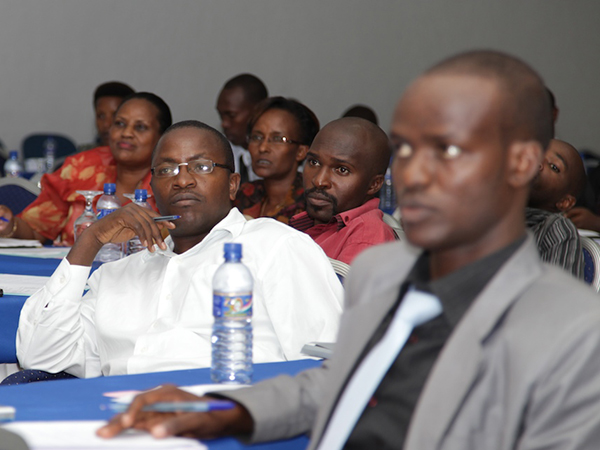Burundi: Celebrating 50 years of independence

This month, Burundi is celebrating its 50th anniversary with a whole range of activities and festivities across the country. The whole nation is celebrating the fact that half a century ago on 1st of July 1962, Burundi gained independence from Belgium. This occasion also provides an opportunity to reflect on the past and develop a vision for the future.
Reflection on the past and drawing lessons for the future
Interpeace’s partner in Burundi, the Centre of Alert and Conflict Prevention (CENAP) joined forces with other Burundian civil society organizations that work on governance and security issues to commemorate this special day. Together, they organized a film screening on elections in post-conflict settings.
The more than 80 participants from different civil society groups, other partner organizations and even several Burundian ministries have sent representatives to take part in the event.
The film provided the basis for a lively discussion, and participants highlighted three main issues that captured their attention: Political programmes; accountability; and the funding of political parties.
Political party programmes do not reflect the needs of the people
“The discussions showed, that a lot of Burundians feel that their political parties fail to develop concrete programmes that the parties can then be measured against after the elections. Another problem is that the programmes differ very little from each other and don’t address the real needs of the population,” explains Libérate Nakimana, CENAP’s Dialogue Club Coordinator.
She goes on to say: “The discussion brought out that we need to take this issue seriously and start to tackle it. A recommendation that came out of the debate was that civil society organizations that are in close contact with the people need to voice their concerns and bring them to the attention of our political leaders so that they start to develop clear political agendas.”
Lack of accountability
“As we’ve already seen in the film, the lack of accountability of elected officials is a source of mistrust. We need to develop ways to hold our politicians accountable for their actions and decisions. One of the participants had a great idea: He suggested that we invest in better education of political leaders as well as the general public. Only informed and knowledgeable citizens are able to hold their leaders accountable. This will also enable voters to move beyond regional and ethnic allegiances,” adds Libérate.
Funding of political parties
“The funding of political parties is a recurring issue of discontent. The problem is that there are no detailed regulations for the financing of political parties. Because of that, there is an increased risk of political parties acquiring funds in an obscure manner. In some political parties only a small group of people has access to the financial resources. All of this harms the democratic process. Civil society groups need to come together to work towards better laws,” emphasizes a participating civil society leader.
Libérate highlights the consequences of the unresolved issue of funding of political parties: “Without sufficient financial resources, political parties are struggling to develop well-defined political programmes because they simply don’t have the money. So this issue is a challenge for political pluralism in our country.” Following the movie screening, one of the participants sums it up nicely: “The film reflects the true reality of what happened in past elections, but it also allows us to reflect on our journey and learn from the past.”
Why a focus on elections in Burundi?
In a recent nationwide consultation that involved over 2,200 Burundians the issues of elections was identified as a peacebuilding priority for the country. Some of the questions that arise in the Burundian context are: How can we manage the pre-election and election periods to ensure a peaceful process? And what mechanisms can we put in place to make sure that the winners and losers of the elections accept the results and do not prevent public institutions from functioning or even resort to violence?
The issue of elections became even more important after the 2010 elections which saw the withdrawal of a majority of opposition parties from the formal political process. This has led to political deadlock in the country.
Elections are competitive by nature and an electoral process can be a challenge for a post-conflict society. If there is a lack of trust and legitimacy, elections within divided societies can even contribute to more violent conflict.
